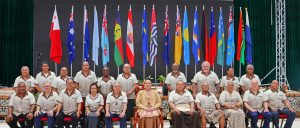As the leaders of the 18 members of Pacific Island Forum (PIF) convened in Tonga this week, one central agenda item was the status of Guam and American Samoa. As unincorporated territories of the United States, both territories previously held observer status with the PIF. This has now been upgraded to associate membership.
Over the past decade, PIF has proven flexible with its membership criteria, with the French self-governing non-sovereign territories of New Caledonia and French Polynesia gaining full membership in 2016. This flexibility is driven by geopolitical calculations, but also complicated by them.
As new associate members, Guam and American Samoa now join Tokelau, a dependent territory of New Zealand, and Wallis and Futuna, a French overseas collectivity. Associate membership affords the ability to speak at the plenary sessions of the leaders’ meetings and in committee meetings, and to nominate individuals for participation in PIF working groups. It is a seat at the table, and an ability to have input in policy, even if it falls short of being part of the decision-making process.
The argument for advancing the status of Guam and American Samoa is that – by virtue of the region they exist within – they share the same regional challenges and concerns around issues like fisheries, transnational crime, maritime safety, general development, and climate change. Due to this, their input on regional governance should be considered critical.
Yet the nature of these territories’ political status means that there are considerations beyond their input on regional issues that affect their communities. The Pacific has increasingly become a space of geopolitical competition – with China more active in the region – and this means that Washington has a keen interest in having greater influence within the PIF.
Given its unincorporated territories – as well as its compacts of free association with Palau, Marshall Islands and Federated States of Micronesia – Washington has effectively been a power of considerable influence in the Pacific Islands region for some time. The United States obviously maintains a significant security presence in the region. Yet it has only maintained dialogue partner status within the PIF – a status it shares with China.
This, obviously, presents a certain amount of status anxiety for Washington, but as the Pacific becomes more of a geopolitically contested space there is also the desire for greater influence within the PIF. Associate membership for its unincorporated territories offers the U.S. an opportunity to transmit ideas that can be discussed and given consideration within forum processes. Guam and American Samoa may primarily be concerned with their direct interests in the region, but their policy positions and advocacy within the forum will be developed in concert with Washington.
Associate membership for these territories also provides Pacific Island countries a way of further accessing Washington’s ear, without being dominated by its weight. Pacific Island countries recognize that the increased geopolitical competition enables individual nations and the region as a whole to have a greater voice and influence on international affairs. More attention on the Pacific means greater resources to address development issues, but this assistance often also comes with complications as new sets of interests emerge for states.
Due to its own considerable influence – and ways of advancing its interests – China looks to have found a proxy within the PIF in the form of the Solomon Islands, which introduced a motion to have Taiwan excluded from its status as a “development partner” within the PIF. Although the motion proved unsuccessful – given that several PIF member states hold official diplomatic ties with Taiwan – the attempt was evidence of how this geopolitical competition can prove disruptive (especially given China’s aggressive response).
While this kind of outside influence on PIF member states can be difficult to avoid, inviting non-sovereign territories further into the PIF’s mechanisms can also generate new complications.
After recent political tensions in New Caledonia, the PIF wished to send a fact-finding mission to the territory – led by the prime ministers of Fiji, Tonga, and Cook Islands – to report on the situation to the PIF leaders’ meeting. However, this created a dispute over who actually has the authority to authorize such a mission – Nouméa or Paris? After initially postponing the mission, a deal was reached with France on the scope of the mission at the PIF leaders’ meeting.
In a region where there are several non-sovereign territories bound to far greater powers, there is a delicate balancing act for the PIF between the gains from having more powerful states dedicate their resources to the region, and the power these states potentially have to overwhelm the objectives and processes of the forum. Associate membership for Guam and American Samoa may give Washington a greater interest in Pacific regionalism but will need to be managed carefully to make sure it is full member states that drive PIF agendas.

































